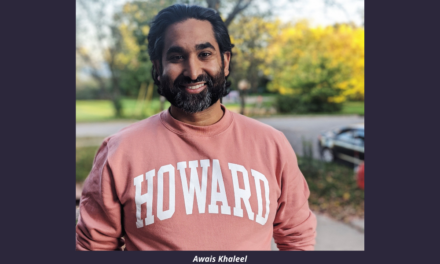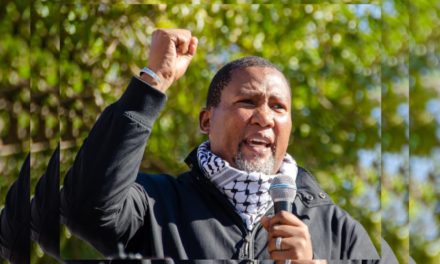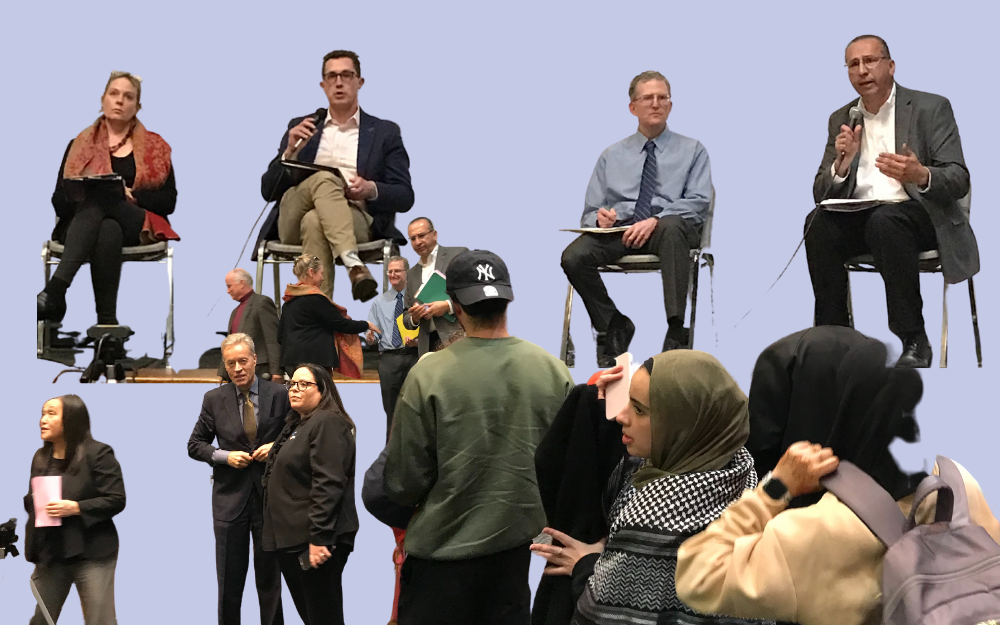
Illustrative photo by Cherrie Hanson
This illustrative photo intends to capture the disconnected conversation between polarized perspectives in Wisconsin’s first major discussion on the Palestinian-Israeli conflict, says its creator, Cherrie Hanson, WMJ managing editor.
Pro-Palestinian and pro-Israeli speakers in Wisconsin’s first major discussion of the Palestinian-Israeli conflict since its recent escalation revealed polarized perspectives, including whether the Israeli military’s bombing of Gaza is self-dense or a genocide.
“I am grateful people with very different viewpoints were willing to be in the same room,” said University of Wisconsin-Milwaukee Vice Chancellor Chia Vang, Ph.D., a lead organizer of the Nov. 21 event, which drew a crowd of almost 400 UWM students, faculty and staff, and Greater Milwaukee community members. UWM administrators say the event was a first step in an important, emotional conversation that will continue at UWM.
The audience sat divided in the large auditorium like parties of a bride and groom, with most pro-Palestinians on one side of the aisle and most pro-Israelis on the other. Several UWM security guards, reminiscent of ushers, stood at the periphery.
Four panelists addressed the historical roots of the Palestinian-Israeli conflict, the impact of these events on people living here and how to move forward to a vocal crowd.
See the UWM Conversation on the Palestinian-Israeli Conflict here on the Wisconsin Coalition for Justice in Palestine YouTube channel.
The panelists
UWM’s Conversation on the Palestinian-Israeli Conflict‘s panel included Othman Atta, executive director of the Islamic Society of Milwaukee, the largest Muslim organization in Wisconsin, and a board member of the Interfaith Conference of Greater Milwaukee; Rabbi Joshua Herman, executive director of Hillel Milwaukee, which serves Jewish students at 11 Milwaukee area colleges and universities; Shale Horowitz, Ph.D., a UWM professor of political science, specializing in international relations and comparative politics; and Caroline Seymour-Jorn, Ph.D., a UWM professor of global studies and a specialist in Middle Eastern cultures and literature.
Douglas Savage, director of UWM’s Institute of World Affairs, moderated the discussion.
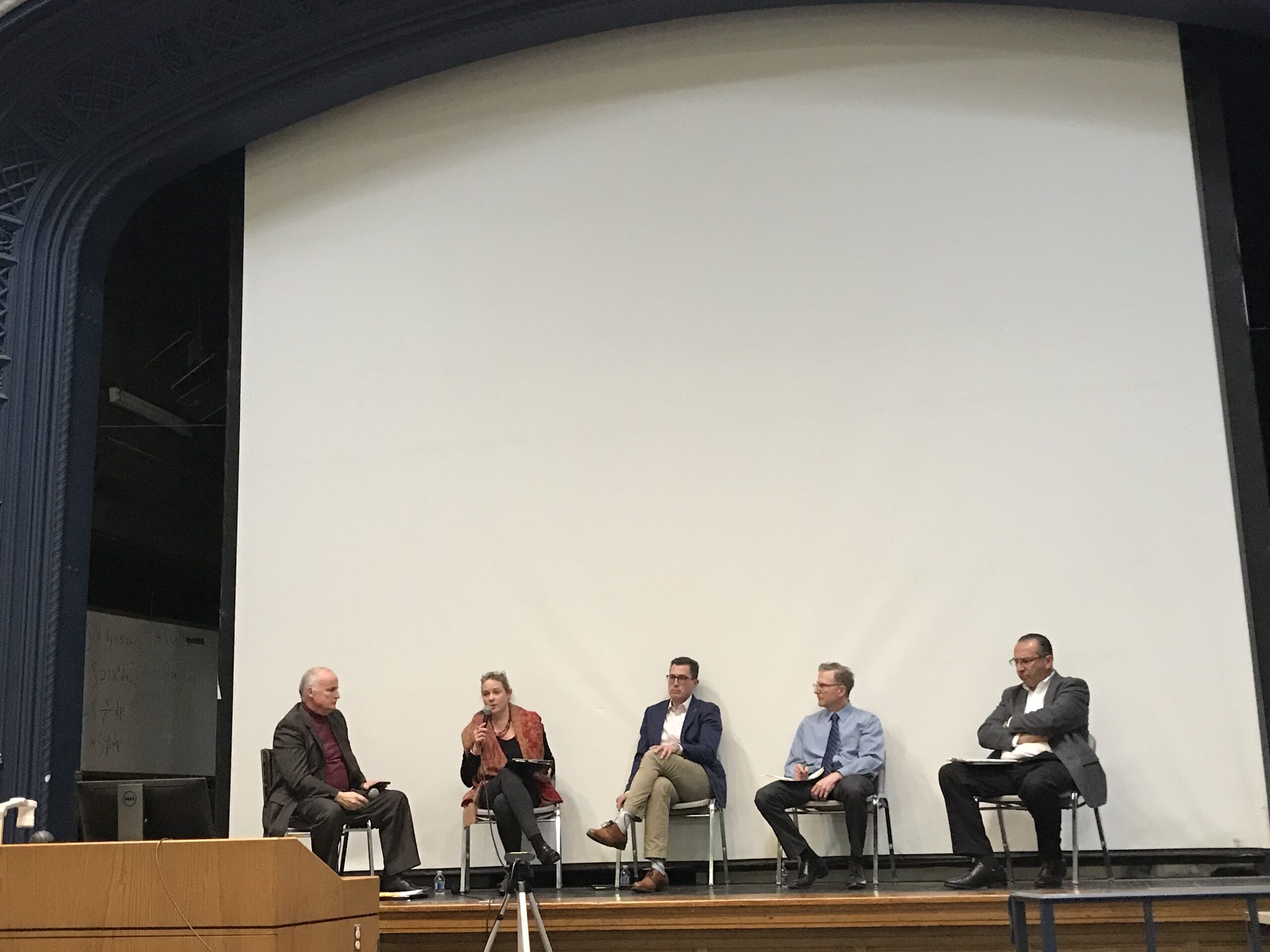
Photo by Cherrie Hanson
Caroline Seymour-Jorn, Ph.D. (second from left) noted she was not affiliated with either side of the Palestinian-Israeli conflict.
Conflicting views of history
As panelists offered significantly different accounts of the history of the conflict, a dozen young people in the pro-Palestinian section held up red-stained palms toward the speakers.
Horowitz recounted recent history, beginning with the United Nations’ 1947 vote to partition British-controlled territory into two states through the 1967 War and Oslo Peace Process to Israel’ complete withdrawal from Gaza in 2005. Hamas gained control of Gaza in 2007 and has launched five major attacks on Israel since, he said.
“To summarize, the reason why there is no Palestinian state is because Palestinian leaders for decades have refused to accept a state unless it also includes the destruction of Israel and its Jewish population,” he said.
“I clearly don’t agree with the narrative Shale (Horowitz) presented,” Atta proclaimed. “There was no Israel in 1947; there was a Palestine.” Applause sounded from the pro-Palestinian side of the room. Atta held up his hand to quiet them.
“The British armed Zionist paramilitary groups,” Atta said. Someone in the audience yelled, “You’re lying.”
“Shut up,” another yelled in response to the audience member.
“But he’s lying,” the first responded.
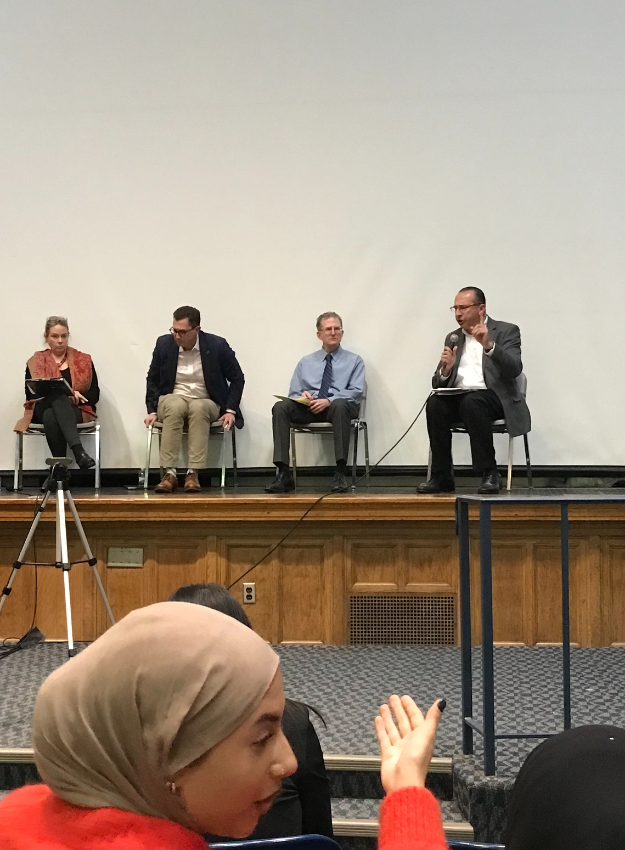
“You know what, it’s ok,” said Atta. “For those of you who seem to have limited knowledge, I would advise you to read Jewish historians such as Ilan Pappe’s The Ethnic Cleansing of the Palestinian People and many others using Israeli archival sources. They will tell you exactly what happened. I’m not here to give you propaganda. This is a university; let’s talk some facts.
“By the end of the (1967) War, Israel controlled 78% of historic Palestine … I don’t have to go through all the wars … Shale (Horowitz) says these were defensive wars. I disagree. These are wars of occupation.”
“A constant refrain we hear from Zionists is Palestinians were given this great proposal to create a Palestinian state and rejected it. The Israelis were so generous. That’s not how the Palestinians viewed it.”
When the PLO made a historic compromise and recognized Israel’s right to exist, they wanted to have a Palestinian state in the 22% of original Palestine Israel occupied—the West Bank and Gaza, with East Jerusalem as the capital, Atta said. “Well, that was not to be.”
Atta drew comparisons between Israel and Apartheid South Africa, where the white Afrikaners created settlements that surrounded and divided indigenous Black communities in order to control them. “Israelis had already put tons of Jewish settlements around Jerusalem and in the West Bank. For a while, there were actually settlements in Gaza. They left Gaza in 2005 and put Gaza under siege.
“This is actually what is going on right now,” he said, slicing the air with his hand. “In the West Bank, right now, where Hamas does not rule, Palestinians are being killed right and left. More Palestinians were killed in the West Bank this year than any other year.”
Atta punctuated each word with a point of his finger, as he said, “The problem is when you have a racist, religious, supremacist state that doesn’t recognize the humanity of all people, where we cannot apply international laws and conventions to resolve this dispute, that is the problem.”
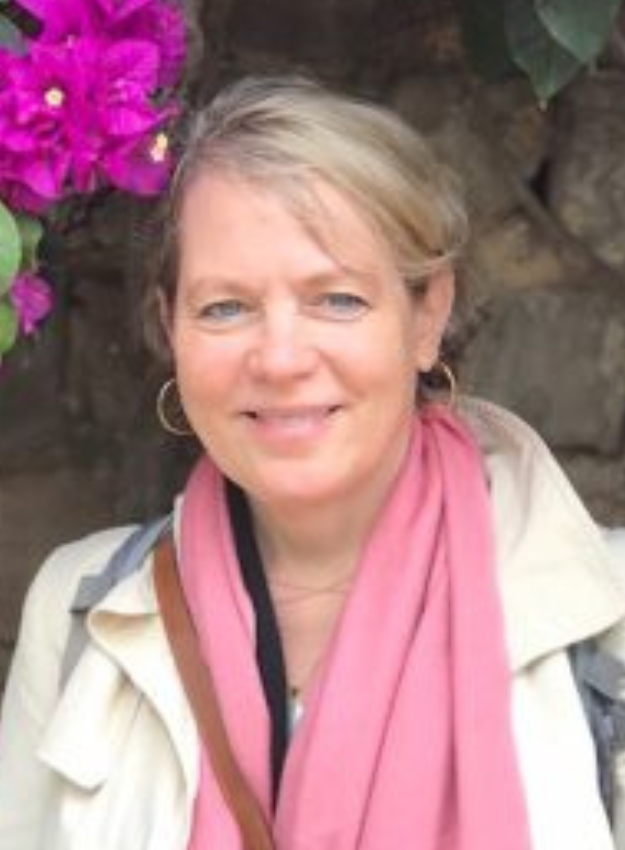
Caroline Seymour-Jorn, Ph.D.
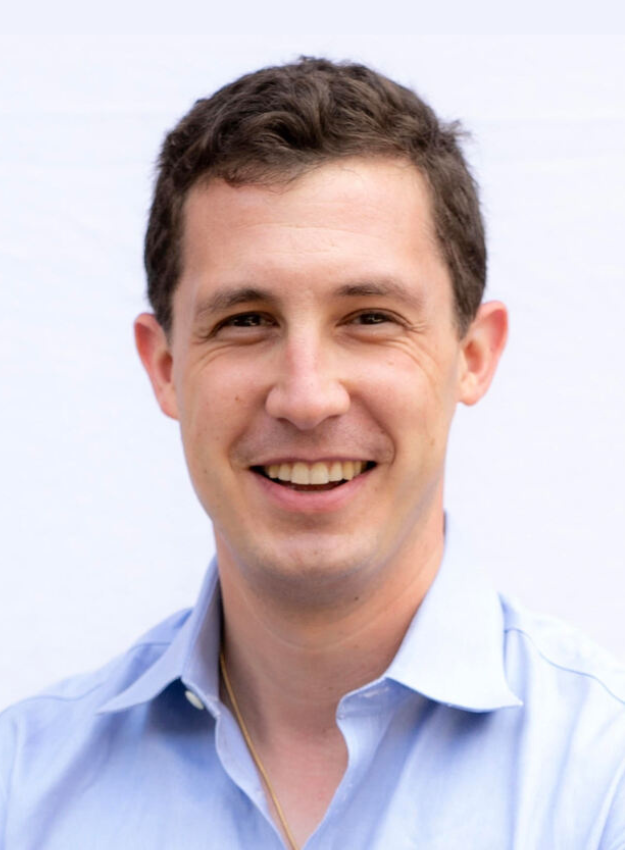
Rabbi Joshua Herman
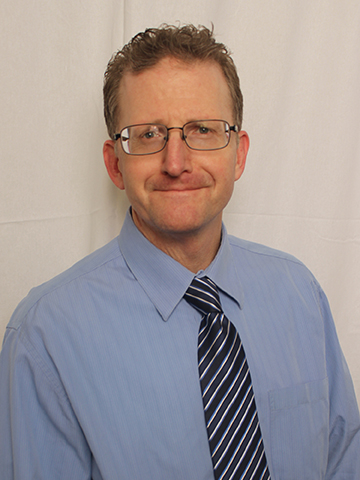
Shale Horowitz, Ph.D.
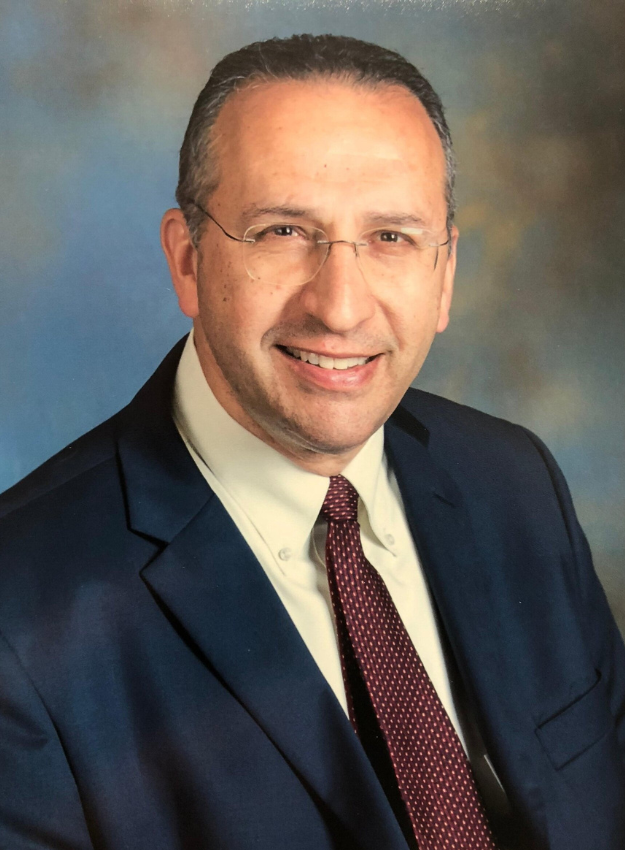
Othman Atta
Speaking softly and slowly in a way that calmed the room, Seymour-Jorn described Hamas’ Oct. 7 attack in Israel “as one in a long line of terrible incidents carried out by both Israelis and Palestinians,” adding “Palestinian deaths have far outnumbered Israelis’.”
Hamas’ attack was “partially a result of an increasingly hardline Israeli settlement policy, the radicalization of both the Israeli settler movement and Islamist group and the weakening of the Palestinian Authority,” she said. It is “also a failure of the international community to arbitrate a just solution that would allow both Jews and Palestinians to live with safety and dignity, and have moderate governmental bodies.
“The roots of this conflict is in European antisemitism,” she continued. “Jews in Europe suffered long periods of persecution and near total annihilation in the Holocaust.” At the same time, “Palestinians have been displaced and expelled from their ancestral homeland in multiple waves since the late 19th century, and this has been overseen by European powers in the 20th century.
“Since 1948, Israel has increased its territories by violent expulsion of Palestinians, seizure of land and destruction of homes. The international community has not done enough to halt this violence.”
Panelists passed the microphone to Herman, who said, “Where you begin a story says something about how you view the story. The characterization that Israel is occupying this land is, I think to many Jews, myself included, pretty offensive. There’s been a continuous Jewish community in this area of the world since antiquity.
“To use terms like ‘colonialism’ is to misrepresent the struggle … The struggle is between two peoples, each indigenous to the same piece of land, two peoples with completely legitimate and understandable national dreams. Both deserve to live in their ancestral homeland in peace and dignity.
“We can disagree about which narrative is more convincing but there are facts that should be respected. Some of those facts are uncomfortable to people who are sympathetic to Israel and some of those facts are uncomfortable to those who are sympathetic to the Palestinian cause. I hope, however, most of us can find sympathy for each side.”
A burst of applause rose from the audience. “I guess sympathy always gets applause,” he noted.
Picking up Horowitz’s earlier argument, Herman said at Oslo and later at the Camp David Accords, Palestinian leaders rejected proposals without giving a counteroffer. “To say absolutely no and not compromise only continues a struggle,” he said.
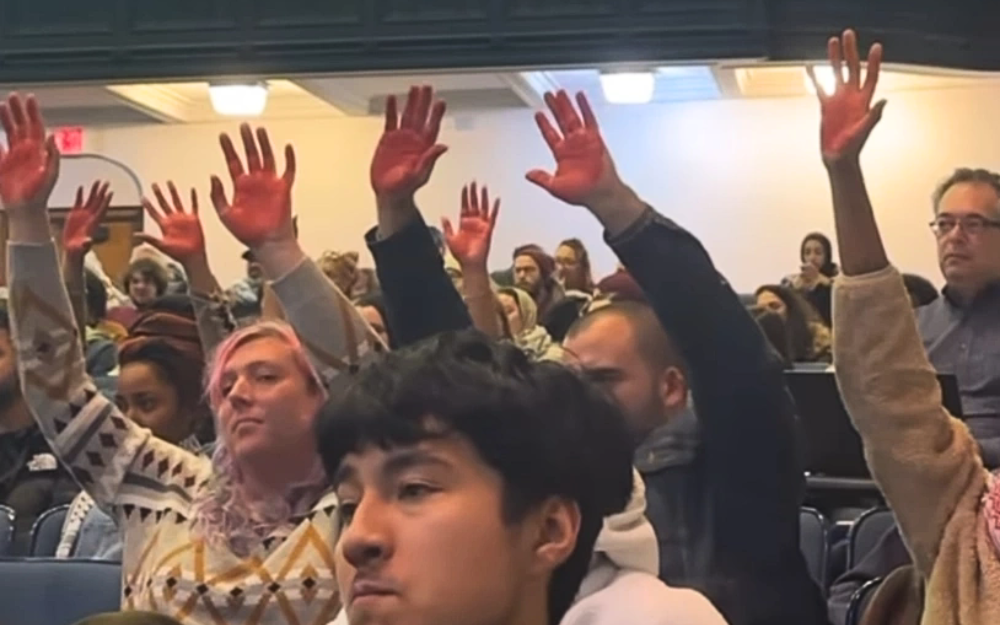
How are we here in Milwaukee impacted?
“Put aside all the issues about the land and who should be there,” Atta urged. “For Palestinians and their supporters, the biggest issue is the human rights catastrophe.
“They see horrifying images of entire buildings brought down on top of people who don’t even have water. Imagine that. You are not only bombing the hell out of the people using the most advanced weaponry that exists, but you cut off their water, food and electricity, and any fuel they needed for hospitals and ambulances, and for equipment, even to move the rubble … This is why we see hundreds of thousands, millions of people demonstrating around the world.
“Five to seven thousand children have been killed. If there were 100, 200 or 500 innocent civilians killed, you’d say Israel is trying to minimize civilian casualties … But that’s not what is going on.”
Another issue is “the pro-Zionist community in this country” is intimidating people from speaking out against Israel, “billionaire CEOs getting people fired from their jobs for exercising their right to express support for innocent Palestinians.” Claps and cheers rang out from a faction of the audience.
“I want you to understand we just heard applause to classic antisemitic hate,” Herman countered. “One of the classical tropes of antisemitism is the notion that Jews control the world based on our control of capital. There are people in this room in Milwaukee, Wisconsin, in the year 2023, applauding the same kind of hateful rhetoric that has led to the murder and torture and genocide of Jews for generations.
“The Jewish community is a traumatized community,” he continued. After shouts from the audience, he added, “So are the Palestinians. I’m not denying that.
“We have all grown up the grandchildren of Holocaust survivors … Israel became the hope for many Jews that finally there was a piece of land in which Jews would no longer be victims.
“On Oct. 7, we saw something many Jews of my generation thought was something confined to the history books … an unbelievable level of not only violence but cruelty,” Herman said. He vividly described horrific examples of the violence he heard Hamas inflicted.
Herman said he “immediately started flipping through social media and found groups, including groups at this university, celebrating the Hamas terrorists … before a single Israeli bomb had fallen on Gaza.
“We knew what was coming next. The second Israel attempted to defend its citizens we would face this kind of outcry.
“I can only make you understand the trauma and pain I feel if I can seek to understand the trauma and pain others feel,” Herman said. “I saw a few hands go up from people in the room who have lost loved ones in Gaza. I lost people I know on Oct. 7 in the attack. I want to say truly and honestly, from the bottom of my heart, I’m very sorry for your loss. I hope we can find a way to feel that love and sympathy for each other instead of simply shouting at each other.”
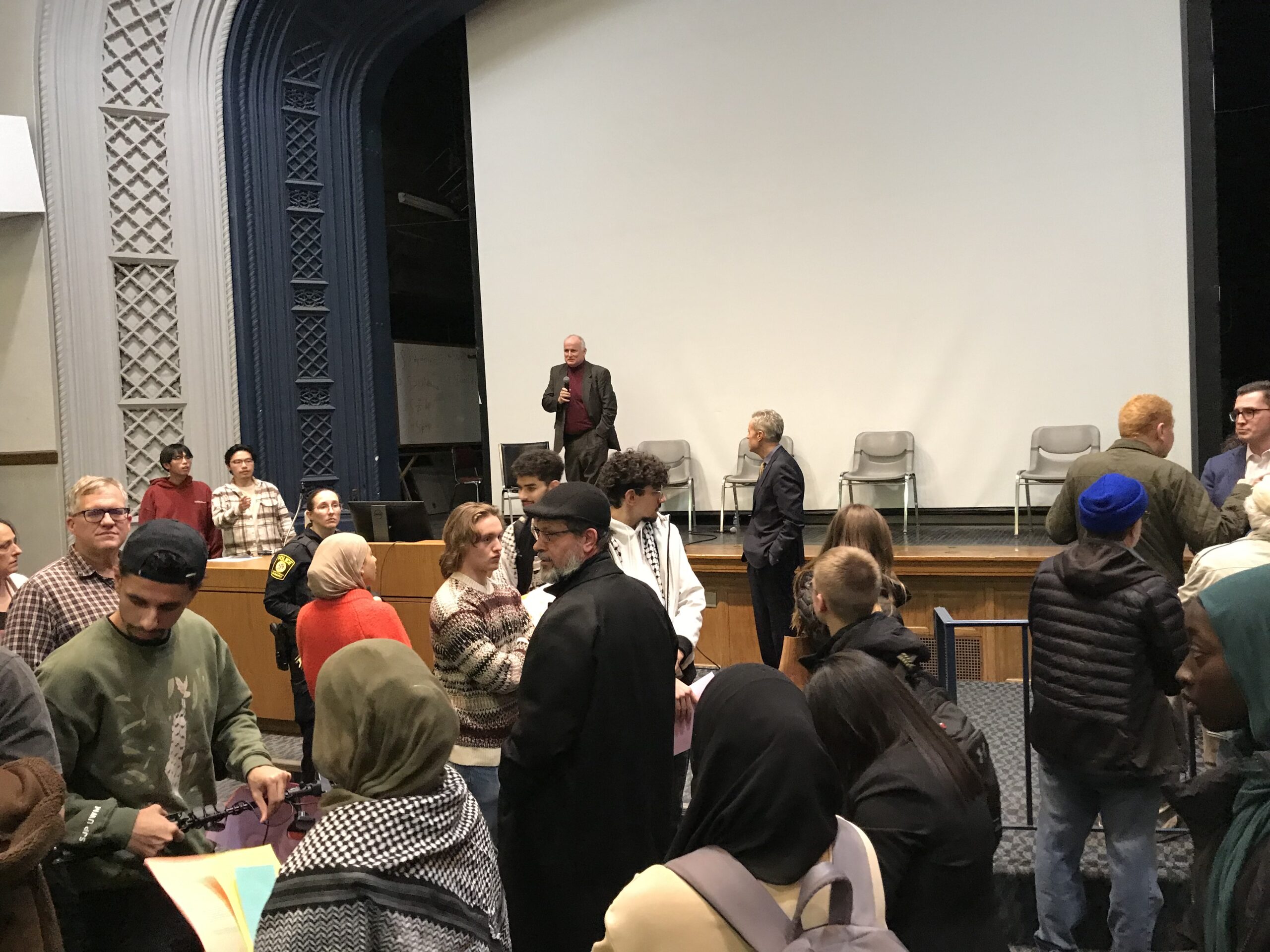
Photo by Cherrie Hanson
Douglas Savage, director of UWM’s Institute of World Affairs and moderator of the discussion, watched from the stage as audience members mingled and talked after the presentation.
Atta rose from his chair and took the microphone, explaining to other panelists as a few in the audience groaned, “I need to answer this for one second. I’ll let you have your turn. I’m willing to stay here till midnight.
“I understand they want us to share in the grief and victimhood they have, but … there is not one Jewish institution, including Hillel and the Milwaukee Jewish Federation, that has ever said one thing about the human rights abuses taking place against the Palestinians. They have funded Israel and tried to constantly close down the Palestinian narrative. How can you say you feel sympathy when it’s convenient but for 75 years, it hasn’t been there?”
“That is wholly untrue and unfair,” Herman responded. “I’ve done it myself and many Jewish institutions have. The question is … where was the condemnation of Oct. 7?”
More points of contention
Horowitz raised the issue of “From the river to the sea, Palestine will be free,” a slogan used in pro-Palestinian demonstrations. “It means the Jewish population (in Israel) should be massacred,” he said.
Atta disagreed. “It expresses Palestinians’ aspirations of freedom. Calling it ‘antisemitic’ is a way of censoring Palestinians,” he said.
Herman objected to using the term “genocide” in relation to the Palestinian-Israeli conflict. “Calling something a genocide against a people that just experienced one of the closest successful genocides in history is not helpful.”
Atta distinguished between Jewish faith and the Israeli state. “We want to get rid of an oppressive apartheid system … We believe in the righteousness of the Jews.
“When we talk about antisemitism … I will be the first to stand against it,” he announced. “If you are trying to practice your faith, I will back you up 100%. But if you are supporting a foreign government subjugating other people, I don’t see you as a Jew, I see you as a Zionist supporter of occupation.”
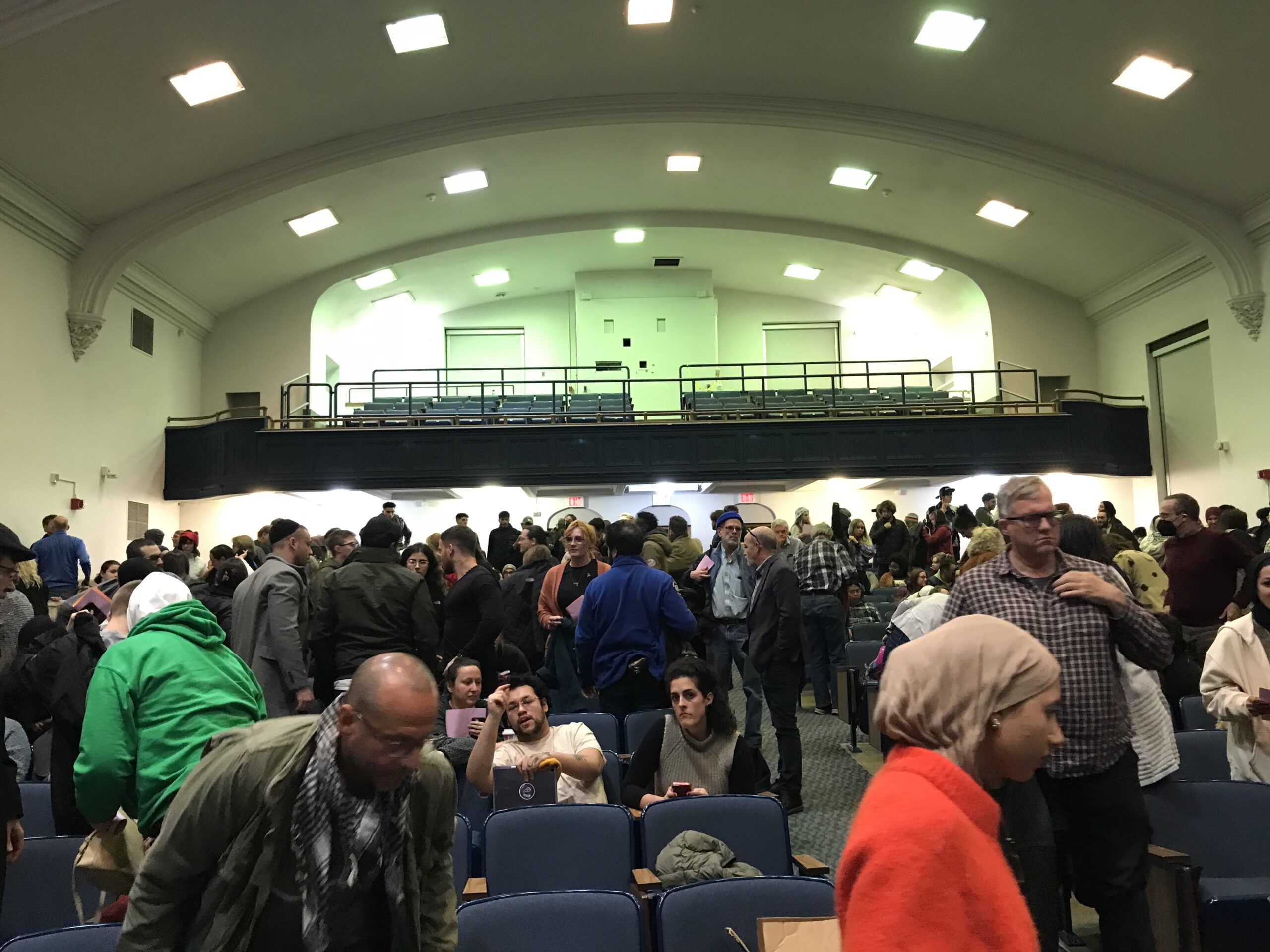
Photo by Cherrie Hanson
Now Horowitz walked across the stage and took the microphone. “The idea that Jews did not have a right to a state, which is what Othman is arguing—” A loud grumble interrupted him. Atta held up his hands and shrugged his shoulders.
Someone yelled, “He never said that.”
“Jews preceded Muslims in the land by 2,000 years,” Horowitz continued. “And about colonialism, there is no more successful example of colonialism in history than the Muslim conquest of an entire region.” Applause rose from one side of the aisle. “And now one people has managed to preserve its identity and return to its land.
“Let me ask you leftists in the audience, if somewhere in Latin America, in the former Spanish Empire, a Native American people had preserved its identity and managed to return to its land and create a state in some small corner of Latin America, would you say they were colonial occupiers, that they had no right to be in the land? Of course, you wouldn’t.
“Also, all the accusations Othman made about how Israel is fighting—you tell me a country that under similar circumstances would make greater efforts than Israel has to spare civilians,” Horowitz said above loud jeers and guffaws.
Finding positive direction
One question remained: how to move forward.
Atta called for classes with readings of narratives from both sides. Multiple panelists suggested more opportunities for dialogue and lectures. That is especially important “for many Americans, especially young Americans, who really may have very little knowledge of this conflict,” Seymour-Jorn said.
Horowitz focused on how discussions should proceed: With “mutual respect, consistency and compromise. We should respect the legitimate aspirations of all people. We should apply our principles in a consistent manner to all people. We should seek compromise where it is reasonable, and expect that of others.”
“One of the ways we could move forward is to say there is tragedy on both sides,” Herman said. He called on UWM Chancellor Mone to work with leaders of other universities to address “the systemic biases that exist in the world of higher education. It is not new that academic and intellectual veneers have been put over old systems of hate.”
In an evening that ended with more questions than answers, Seymour-Journ asked, “What would it mean to have an equal division of land in Palestine and Israel? Right now, there is nothing close to that. What sacrifices would it entail?” she asked over heckles.
“How are we going to get past this terrible impasse before more people are killed on both sides?”

